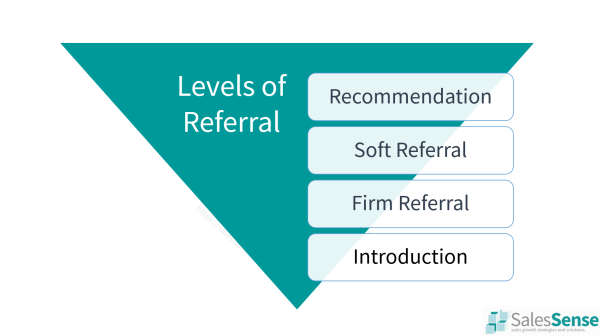Recommendations are easier to get than referrals and a referral is easier to obtain than an introduction.

All wisdom begins with a definition of terms. How are recommendations different from referrals or introductions?
What is a recommendation?
If I ask you to suggest who I approach to sell my services and you make some suggestions, those are recommendations. You are giving me the benefit of your experience and expertise.
What is a referral?
If you make a recommendation about who I should sell because you know things about the person or company, this is a soft referral. If you are known to the person or company and you permit me to say you referred me, that is a firm referral.
What is an introduction?
If you call or write to a person or company known to you and say that you think they should speak with me about what I sell, that is an introduction.
A request for recommendations is less threatening than a request for a referral which in turn, is less threatening than a request for an introduction. A powerful referral strategy is to ask for introductions, expecting to be turned down and then requesting recommendations.
When you get recommendations, you can turn some of them into introductions.
Start by saying thanks.
"Thanks for agreeing to help us with some recommendations."
The first level is recommendations.
Usually, a recommendation gives you the names of organisations your source thinks can benefit from what you sell.
This might or might not include the names of people to approach.
Start with the easiest referral grouping. The possibilities from easiest to hardest are:
- Sister, group, or parent companies
- Suppliers
- Business partners
- Customers
If the customer has a sister, group, or parent company, say:
"Who in your wider group of companies do you think could benefit from what we have done together in the way that you have?
Prompt to get the whole list and then ask:
"If you were me, which would you approach first?"
Use, "and then" to prioritise the list.
For each recommendation, ask why your source thinks they have a need.
And then, "Who is the best person to approach?"
Now ask, "Do you think <name> would be more open to the opportunity if you were to introduce me?
If you get a yes, say, "Could we try and get <name> on the phone now?"
If you sense discomfort or <name> isn't available, try plan B:
Ask, "Would you be willing to give us a letter of introduction?"
Have some suitable words prepared so that if you get a 'yes', you can get the job done there and then.
You may be able to adapt this example letter of introduction:
Headline referring to the benefits obtained.
Dear [name],
As you may know, we have recently been working to improve our [insert a reference to the things that have improved because of what they bought from you]. I am very pleased with the progress we have made.
The improvements have come as a result of engaging a consulting firm, [company name]. They helped us adopt some new approaches which have yielded some excellent results:
- Most significant quantified business benefit.
- Next most significant quantified business benefit.
- Next most significant quantified business benefit.
In addition to improving business predictability, the changes have increased average sales yields and profitability.
I’m not sure if you can get the same results, however, [company name] can help you find out.
I have given [consultant's name], their [position], your name and contact details and recommend that you investigate the potential for [company name] to help you get the benefits we have.
If you have questions, please ask.
Sincerely,
[your name]
It can take a while to complete a conversation about referrals using this process. Don't try to obtain a long list all at once. Try the different referral groupings at different times as your customer relationship strengthens.
Be sure to thank your customers for all referrals and when they are successful, show your appreciation through a gift, perk, or donation to a charity of their choice.
This is the thirteenth of 17 referral prospecting methods shared on this site. See the others here.
If you want to get more introductions from referrals, we can help. Call +44 (0)1392 851500. Alternatively, use the contact form here or send an email to jimm@salessense.co.uk.












